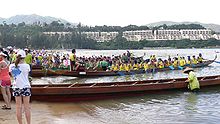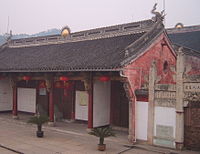- Duanwu Festival
-
Duanwu Festival 
Hong Kong Discovery Bay's dragon boat racesOfficial name Duanwu Festival (端午節), Tuen Ng Jit Also called Double Fifth
Dragon Boat Festival (龍船節)
Gō͘-go̍eh-cheh/Gō͘-ge̍h-choeh (五月節)
Gō͘-ji̍t-cheh/Gō͘-ji̍t-choeh (五日節)Observed by Chinese Type Cultural Date 5th day of the 5th lunar month 2011 date June 6 Observances Dragon boat racing, consumption of xionghuangjiu and zongzi Related to Children's Day, Dano, Tết Đoan Ngọ, Yukka Nu Hii Duanwu Festival Traditional Chinese 端午節 Simplified Chinese 端午节 Transcriptions Mandarin - Hanyu Pinyin Duānwǔ Jié Min - Hokkien POJ Toan-ngó͘-cheh
Toan-ngó͘-choeh
Toan-ngó͘-chiatAlternative Chinese name Traditional Chinese 龍船節 Simplified Chinese 龙船节 Literal meaning Dragon Boat Festival Transcriptions Mandarin - Hanyu Pinyin Lóngchuán Jié "Dragon Boat Festival" redirects here. For dragon boating as a sport, see dragon boat.Duanwu Festival, also known as Dragon Boat Festival and the Double Fifth, is a traditional and statutory holiday originating in China and associated with a number of East Asian and Southeast Asian societies. In Mandarin, it is known by the name Duānwǔ Jié; in Hong Kong and Macau, by the Cantonese name Tuen Ng Jit; in Hokkien-speaking areas, by the names Gō͘-go̍eh-cheh/Gō͘-ge̍h-choeh (五月節) and Gō͘-ji̍t-cheh/Gō͘-ji̍t-choeh (五日節). In 2008, it was recognised as a public holiday in mainland China for the first time since the 1940s.[1][2] The festival has also long been celebrated in Taiwan, Singapore, and Malaysia. Equivalent and related festivals in Asia include the Kodomo no hi in Japan, Dano in Korea, and Tết Đoan Ngọ in Vietnam.
The festival occurs on the 5th day of the 5th month of the lunar calendar on which the Chinese calendar is based. This is the source of the alternative name of Double Fifth.[3] In 2011, this fell on June 6. The focus of the celebrations includes eating the rice dumpling zongzi (Chinese: 粽子; pinyin: zòngzi)[4], drinking realgar wine xionghuangjiu (Chinese: 雄黃酒; pinyin: Xiónghuángjiǔ), and racing dragon boats.
Like all other traditional festivals, Duanwu is reckoned in accordance with the lunar calendar consisting of 29 or 30 days. For this reason, Duanwu—the fifth day of the fifth moon, or double fifth—drifts from year to year on the Gregorian (solar) calendar.The moon is considered to be at its strongest around the time of summer solstice ("mid-summer" in traditional Japan, but "beginning" of summer elsewhere) when the daylight in the northern hemisphere is the longest. The sun (yang), like the dragon (long), traditionally represents masculine energy, whereas the moon (yue), like the phoenix (or firebird, fenghuang), traditionally represents feminine energy. Summer solstice is considered the peak annual moment of male energy[5] while the winter solstice, the longest night of the year, represents the peak annual moment of feminine energy. The masculine image of the dragon is thus naturally associated with Duanwu.
Contents
History
Origin
The Duanwu Festival is believed to have originated in ancient China. A number of theories exist about its origins as a number of folk traditions and explanatory myths are connected to its observance. Today the best known of these relates to the suicide in 278 BCE of Qu Yuan, poet and statesman of the Chu kingdom during the Warring States period.
Qu Yuan
Main article: Qu YuanThe best-known traditional story holds that the festival commemorates the death of poet Qu Yuan (Chinese: 屈原) (c. 340 BCE – 278 BCE) of the ancient state of Chu, in the Warring States Period of the Zhou Dynasty.[6] A descendant of the Chu royal house, Qu served in high offices. However, when the king decided to ally with the increasingly powerful state of Qin, Qu was banished for opposing the alliance. Qu Yuan was accused of treason.[6] During his exile, Qu Yuan wrote a great deal of poetry, for which he is now remembered. Twenty-eight years later, Qin conquered the capital of Chu. In despair, Qu Yuan committed suicide by drowning himself in the Miluo River on the fifth day of the fifth lunar month.
It is said that the local people, who admired him, dropped bamboo leaf-wrapped rice cakes into the river to feed Qu Yuan in the afterlife. The rice was wrapped so that fish would not eat the rice meant to be eaten in Qu Yuan's afterlife.[6] This is said to be the origin of zongzi. The local people were also said to have paddled out on boats, either to scare the fish away or to retrieve his body. This is said to be the origin of dragon boat racing.
Wu Zixu
Main article: Wu ZixuDespite the modern popularity of the Qu Yuan origin theory, in the former territory of the state of Wu, the festival commemorated Wu Zixu (526 BCE* – 484 BCE). Wu Zixu was a loyal advisor whose advice was ignored by the king to the detriment of the kingdom. Wu Zixu was forced to commit suicide by the king Fuchai, with his body thrown into the river on the fifth day of the fifth month. After his death, in places such as Suzhou, Wu Zixu is remembered during the Duanwu Festival to this day.
- It seems that, here, Wu Zixu's birth year is false because Wu Zixu designed and built the city of Suzhou in 514 BCE. Thus, if he were born in 526 BCE, he must be just 12 years old at the time of the construction of Suzhou, which is totally impossible. Actually, the birth year of Wu Zixu is unknown.
Cao E
Although the Qu Yuan origin theory is the most popular, much of Northeastern Zhejiang (Shaoxing, Ningbo and Zhoushan) commemorates Cao E (曹娥) (130 CE - 143 CE) rather than Qu Yuan. Cao E's father Cao Xu (曹盱) was a shaman who presided over local ceremonies in Shangyu in Zhejiang province. In the year 143 CE, while presiding over a ceremony commemorating Wu Zixu during the Duanwu Festival, Cao Xu accidentally falls into the river. Cao E, in an act of filial piety, decided to find her father in the river, searching for three days trying to find him. After five days, she and her father were both found dead at the river, which they died from drowning. Eight years later, in 151 CE, a temple was built in Shangyu dedicated to the memory of Cao E and her sacrifice for filial piety. To this day, a tributary of the Qiantang River is named after Cao E.
Pre-existing holiday
Some modern researchers suggest that the stories of Qu Yuan or Wu Zixu were superimposed on a pre-existing holiday tradition. The promotion of these stories over the earlier lore of the holiday seems to have been encouraged by Confucian scholars seeking to legitimize and strengthen their influence at a time when Buddhism, a foreign belief system, was gaining influence in China. The Records of the Grand Historian of that era relate to this.[clarification needed]
Many traditional rituals of the Duanwu Festival emphasize the avoidance of disease. The desire to prevent health hazards associated with the mid-summer months may have been the primary original motive behind the holiday.
Another theory, advanced by Wen Yiduo, is that the Duanwu Festival had its origins in dragon worship. Support is drawn from two key traditions of the festival: the tradition of zongzi, or throwing food into the river, and dragon boat racing. The food may have originally represented an offering to the dragon king, while dragon boat racing naturally reflects reverence of the dragon and the active yang energy associated with it. This combines with the tradition of visiting friends and family on boats.
Another suggestion is that the festival celebrates a widespread feature of east Asian agrarian societies: the harvest of winter wheat. Offerings were regularly made to deities and spirits at such times: in the ancient Yue, dragon kings; in the ancient Chu, Qu Yuan; in the ancient Wu, Wu Zixu (as a river god); in ancient Korea, mountain gods (see Dano (Korean festival)). As interactions between different regions increased, these similar festivals eventually merged into one holiday.
Public holiday
The festival was long marked as a festival culturally in China. However, the People's Republic of China government, established in 1949, did not officially recognize Duanwu as a public holiday. Beginning in 2005, the government began to plan for the re-recognition of three traditional holidays, including Duanwu.[7] In 2008, Duanwu was celebrated as not only a festival but also a public holiday in the People's Republic of China for the first time.[8]
Activities
Three of the most widespread activities for Duanwu Festival are eating (and preparing) zongzi, drinking realgar wine, and racing dragon boats.[9]
Other common activities include hanging up icons of Zhong Kui (a mythic guardian figure), hanging mugwort and calamus, taking long walks, and wearing perfumed medicine bags. Other traditional activities include a game of making an egg stand at noon(this "game" is one that if you stand at exactly 12.00 noon you will have luck for the next year), and writing spells. All of these activities, together with the drinking of realgar wine, were regarded by the ancients as effective in preventing disease or evil and promoting health and well-being.
In the Republic of China, Duanwu was also celebrated as "Poets' Day," due to Qu Yuan's status as China's first poet of well renown. In modern Taiwan, zongzi are no longer thrown into rivers, but people still eat them as a holiday tradition and testament to Qu Yuan's self-determination.
Culture
The Taiwanese version of the holiday is commemorated in a solo piano work, "Dragon Boat Festival" (龍舟競渡, 1996) by Tyzen Hsiao.
See also
References
- ^ Decree of the State Council of the People's Republic of China (No.513) 2008. (Index entry, State Council Gazette Issue 2 Serial No. 1253)
- ^ Chinese mark first "official" Qingming
- ^ Double Fifth (Dragon Boat) Festival for the name "Double Fifth"
- ^ Duanwu Festival is also known as 肉粽節 (Bah-chàng-cheh or Bah-chàng-choeh), literally "meat rice dumpling festival" in Hokkien.
- ^ Chan, Arlene; Humphries, Susan (2009-05-25). Paddles Up!: Dragon Boat Racing in Canada. Dundurn Press Ltd.. p. 27. ISBN 9781554883950. http://books.google.com/books?id=LVj3enfaK5IC&pg=PA27. Retrieved 1 June 2011.
- ^ a b c SCMP. "SCMP." Earthquake and floods make for muted festival. Retrieved on 2008-06-09.
- ^ People's Daily. "Peopledaily." China to revive traditional festivals to boost traditional culture. Retrieved on 2008-06-09.
- ^ Xinhua Net. "First day-off for China's Dragon Boat Festival helps revive tradition." Xinhua News Agency. Published 2008-06-08. Retrieved on 2008-06-09.
- ^ "Dragon Boating Not Just for Asians". AsianWeek. Published 2008-10-02. Retrieved on 2008-10-03.
External links
- Dragon Boat Net, about the dragon boat sport and its tradition
- Dragon Boat Festival on the official Hong Kong tourism website
- More pictures of Dragon Boat Festival
- Dragon Boat World Int. - the world's dragon boat magazine
- History, Tradition and Legends of Dragon Boat Festival
 Public holidays in the People's Republic of China
Public holidays in the People's Republic of ChinaGolden Weeks Other Holidays New Year's Day • Lantern Festival • Qingming Festival • Workers' Day • Duanwu Festival • Mid-Autumn FestivalNew Year's Day · Lunar New Year (3 days) · Ching Ming Festival · Good Friday · The day following Good Friday · Easter Monday · The Birthday of the Buddha · Labour Day · Tuen Ng Festival · Hong Kong Special Administrative Region Establishment Day · The day following the Chinese Mid-Autumn Festival · National Day · Chung Yeung Festival · Christmas Day · The first weekday after Christmas DayCategories:- Chinese holidays
- Chinese calendars
- June observances
- Buddhist festivals
- Dragon boat racing
Wikimedia Foundation. 2010.


